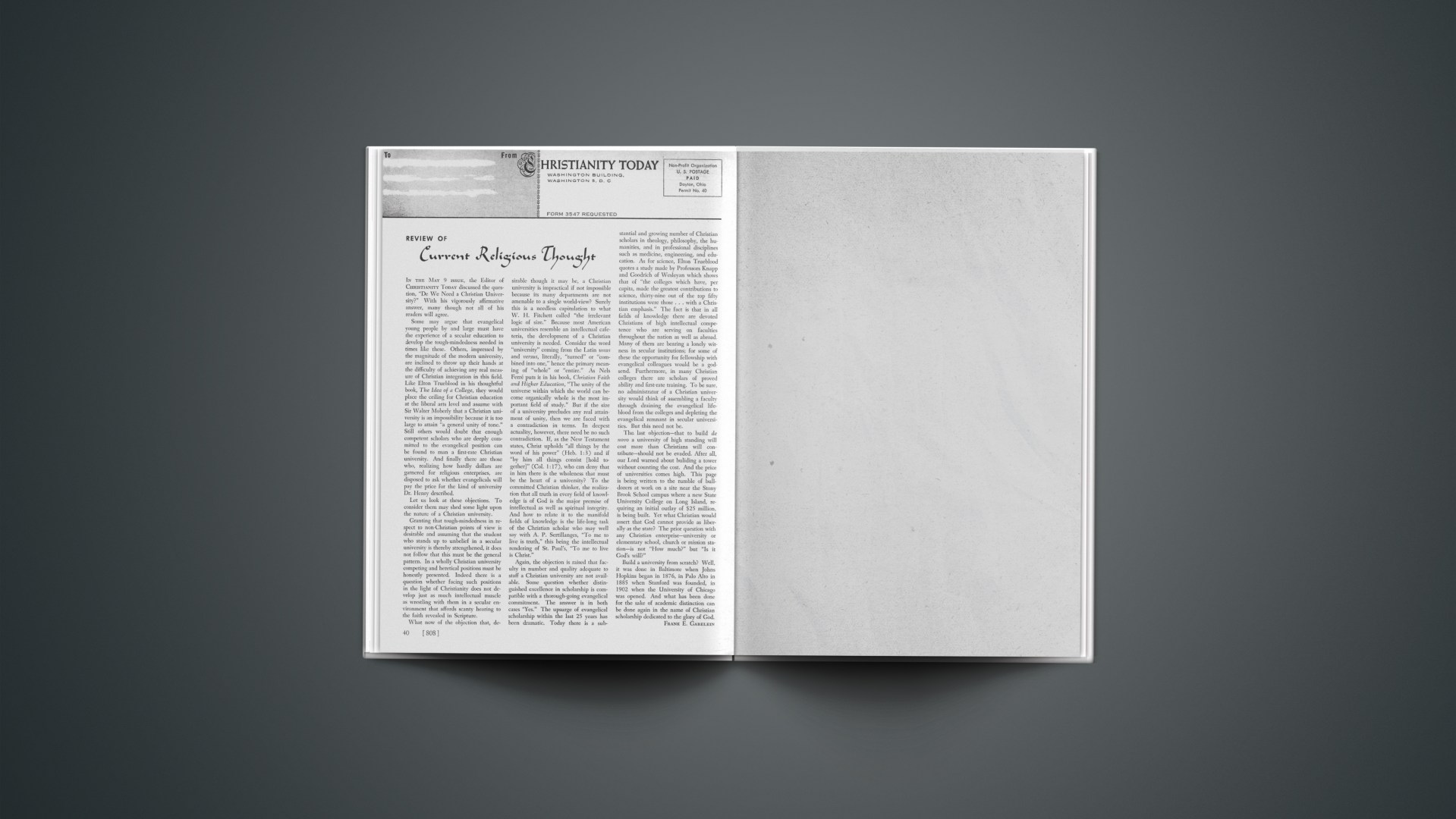In the May 9 ISSUE, the Editor of CHRISTIANITY TODAY discussed the question, “De We Need a Christian University?” With his vigorously affirmative answer, many though not all of his readers will agree.
Some may argue that evangelical young people by and large must have the experience of a secular education to develop the tough-mindedness needed in times like these. Others, impressed by the magnitude of the modern university, are inclined to throw up their hands at the difficulty of achieving any real measure of Christian integration in this field. Like Elton Trueblood in his thoughtful book, The Idea of a College, they would place the ceiling for Christian education at the liberal arts level and assume with Sir Walter Moberly that a Christian university is an impossibility because it is too large to attain “a general unity of tone.” Still others would doubt that enough competent scholars who are deeply committed to the evangelical position can be found to man a first-rate Christian university. And finally there are those who, realizing how hardly dollars are garnered for religious enterprises, are disposed to ask whether evangelicals will pay the price for the kind of university Dr. Henry described.
Let us look at these objections. To consider them may shed some light upon the nature of a Christian university.
Granting that tough-mindedness in respect to non-Christian points of view is desirable and assuming that the student who stands up to unbelief in a secular university is thereby strengthened, it does not follow that this must be the general pattern. In a wholly Christian university competing and heretical positions must be honestly presented. Indeed there is a question whether facing such positions in the light of Christianity does not develop just as much intellectual muscle as wrestling with them in a secular environment that affords scanty hearing to the faith revealed in Scripture.
What now of the objection that, desirable though it may be, a Christian university is impractical if not impossible because its many departments are not amenable to a single world-view? Surely this is a needless capitulation to what W. H. Fitchett called “the irrelevant logic of size.” Because most American universities resemble an intellectual cafeteria, the development of a Christian university is needed. Consider the word “university” coming from the Latin units and versus, literally, “turned” or “combined into one,” hence the primary meaning of “whole” or “entire.” As Neis Ferré puts it in his book, Christian Faith and Higher Education, “The unity of the universe within which the world can become organically whole is the most important field of study.” But if the size of a university precludes any real attainment of unity, then we are faced with a contradiction in terms. In deepest actuality, however, there need be no such contradiction. If, as the New Testament states, Christ upholds “all things by the word of his power” (Heb. 1:3) and if “by him all things consist [hold together]” (Col. 1:17), who can deny that in him there is the wholeness that must be the heart of a university? To the committed Christian thinker, the realization that all truth in ever) field of knowledge is of God is the major premise of intellectual as well as spiritual integrity. And how to relate it to the manifold fields of knowledge is the life-long task of the Christian scholar who may well say with A. P. Sertillanges, “To me to live is truth,” this being the intellectual rendering of St. Paul’s, “To me to live is Christ.”
Again, the objection is raised that faculty in number and quality adequate to staff a Christian university are not available. Some question whether distinguished excellence in scholarship is compatible with a thorough-going evangelical commitment. The answer is in both cases “Yes.” The upsurge of evangelical scholarship within the last 25 years has been dramatic. Today there is a substantial and growing number of Christian scholars in theology, philosophy, the humanities, and in professional disciplines such as medicine, engineering, and education. As for science, Elton Trueblood quotes a study made by Professors Knapp and Goodrich of Wesleyan which shows that of “the colleges which have, per capita, made the greatest contributions to science, thirty-nine out of the top fifty institutions were those … with a Christian emphasis.” The fact is that in all fields of knowledge there are devoted Christians of high intellectual competence who are serving on faculties throughout the nation as well as abroad. Many of them are bearing a lonely witness in secular institutions; for some of these the opportunity for fellowship with evangelical colleagues would be a godsend. Furthermore, in many Christian colleges there are scholars of proved ability and first-rate training. To be sure, no administrator of a Christian university would think of assembling a faculty through draining the evangelical lifeblood from the colleges and depleting the evangelical remnant in secular universities. But this need not be.
The last objection—that to build de novo a university of high standing will cost more than Christians will contribute—should not be evaded. After all, our Lord warned about buliding a tower without counting the cost. And the price of universities comes high. This page is being written to the rumble of bulldozers at work on a site near the Stony Brook School campus where a new State University College on Long Island, requiring an initial outlay of $25 million, is being built. Yet what Christian would assert that God cannot provide as liberally as the state? The prior question with any Christian enterprise—university or elementary school, church or mission station—is not “How much?” but “Is it God’s will?”
Build a university from scratch? Well, it was done in Baltimore when Johns Hopkins began in 1876, in Palo Alto in 1885 when Stanford was founded, in 1902 when the University of Chicago was opened. And what has been done for the sake of academic distinction can be done again in the name of Christian scholarship dedicated to the glory of God.










